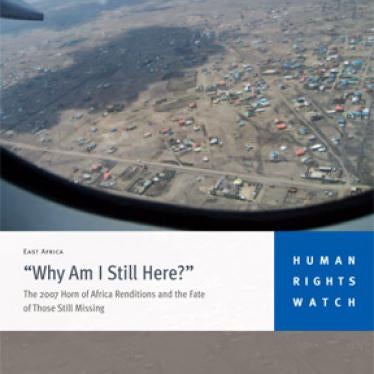Two days after this report was issued, eight of the ten rendition victims known to be in Ethiopian jails were released to Kenya. The whereabouts of 22 others remains unknown.
(Washington, DC) - At least 10 victims of the 2007 Horn of Africa rendition program still languish in Ethiopian jails and the whereabouts of several others is unknown, Human Rights Watch said in a report released today. Several of the detained men were interrogated by US officials in Addis Ababa soon after they were secretly transferred from Kenya to Somalia, and then to Ethiopia in early 2007.
The 54-page report, "‘Why Am I Still Here?': The Horn of Africa Renditions and the Fate of the Missing," examines the 2007 rendition operation, during which at least 90 men, women, and children fleeing the armed conflict in Somalia were unlawfully rendered from Kenya to Somalia, and then on to Ethiopia. The report documents the treatment of several men still in Ethiopian custody, as well as the previously unreported experiences of recently released detainees, several of whom described being brutally tortured.
"The dozens of people caught up in the secret Horn of Africa renditions in 2007 have suffered in silence too long," said Jennifer Daskal, senior counterterrorism counsel at Human Rights Watch and author of the report. "Those governments involved - Ethiopia, Kenya and the US - need to reverse course, renounce unlawful renditions, and account for the missing."
In late 2006, the Bush administration backed an Ethiopian military offensive that ousted the Islamist authorities from the Somali capital Mogadishu. The fighting caused thousands to flee across the border into Kenya, including some who were suspected of terrorist links.
Kenyan authorities arrested at least 150 men, women, and children from more than 18 countries - including the United States, the United Kingdom, and Canada - in operations near the Somali border and held them for weeks without charge in Nairobi. In January and February 2007, the Kenyan government then rendered dozens of them - with no notice to families, lawyers or the detainees themselves - on flights to Somalia, where they were handed over to the Ethiopian military. Ethiopian forces also arrested an unknown number of people in Somalia.
Those rendered were later transported to detention centers in the Ethiopian capital Addis Ababa and other Ethiopian towns, where they effectively disappeared. Denied access to their embassies, their families, and international humanitarian organizations such as the International Committee of the Red Cross, the detainees were even denied phone calls home. Several have said that they were housed in solitary cells, some as small as two meters by two meters, with their hands cuffed in painful positions behind their backs and their feet bound together.
A number of prisoners were questioned by US Central Intelligence Agency and Federal Bureau of Investigation agents in Addis Ababa. From February to May 2007, Ethiopian security officers daily transported detainees - including several pregnant women - to a villa where US officials interrogated them about suspected terrorist links. At night, the Ethiopian officers returned the detainees to their cells.
"The United States says that they were investigating past and current threats of terrorism," Daskal said. "But the repeated interrogation of rendition victims who were being held incommunicado makes Washington complicit in the abuse."
For the most part, detainees were sent home soon after their interrogation by US agents ended. Of those known to have been interrogated by US officials, just eight Kenyans remain. (A ninth Kenyan in Addis Ababa was rendered to Ethiopia in July/August 2007, after US interrogations reportedly stopped.) These men, who have not been subjected to any interrogation since May 2007, would likely have been repatriated long ago but for the Kenyan government's longstanding refusal to acknowledge their claims to Kenyan citizenship or to take steps to secure their release.
Human Rights Watch recently spoke by telephone to several of the Kenyans in detention in Ethiopia, many of whom complained of physical ailments and begged for someone to help get them home. Although Kenyan Prime Minister Raila Odinga made a campaign pledge to help repatriate these detainees, little progress has been made to date. In mid-August 2008, Kenyan authorities visited these men for the first time. The officials reportedly told the detainees they would be home within a few weeks, but more than a month and a half has now passed.
"The previous Kenyan government deported its own citizens and then left them to rot in Ethiopian jails," Daskal said. "The new Kenyan government should reverse course, bring these men home, and show that it is not following the same shameful path as the old."
The Ethiopian government also used the rendition program for its own purposes. For years, the Ethiopian military has been trying to quell domestic Ogadeni and Oromo insurgencies that receive support from neighboring countries, such as Ethiopia's archrival, Eritrea. The Ethiopian intervention in Somalia and the multinational rendition program provided them a convenient means to gain custody over people whom they could interrogate for suspected insurgent links. Once these individuals were in detention, Ethiopian military interrogators and guards reportedly subjected them to brutal beatings and torture.
Detainees said Ethiopian interrogators pulled out their toenails, held loaded guns to their heads, crushed their genitals, and forced them to crawl on their elbows and knees through gravel. Several reported being beaten to the point of unconsciousness.
The Human Rights Watch report calls upon the Ethiopian government to immediately release the rendition victims still in its custody or prosecute them in a court that meets basic fair trial standards. It also urges the Kenyan government to take immediate steps to secure the repatriation of Kenyan nationals still in Ethiopian custody, and the US government to withhold counterterrorism assistance from both governments until they provide a full accounting of all the missing detainees.







